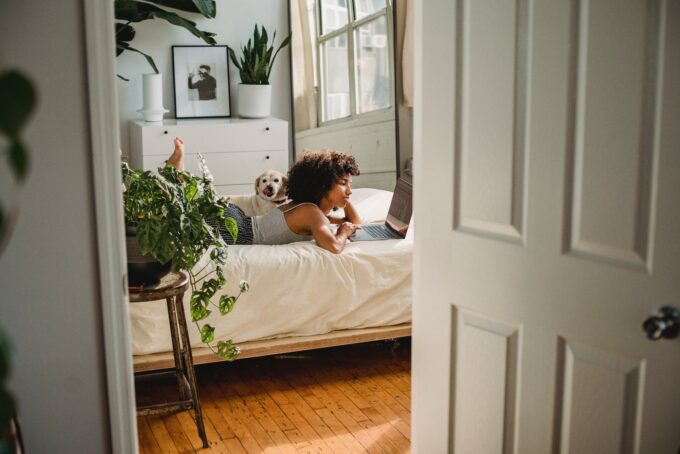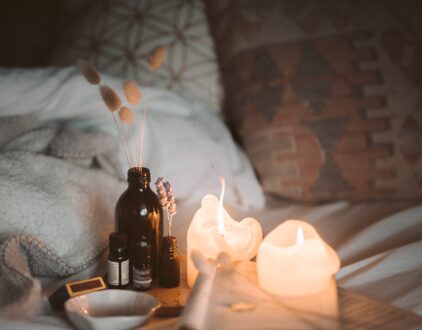For many people, achieving restful sleep can seem near impossible. In fact, according to the Cleveland Clinic, more than 100 million people living in the U.S. say that they don’t get proper sleep. This can be caused by a myriad of factors, including poor sleep habits, an uncomfortable sleep environment, or even medications. But even though inadequate sleep is common, creating a regular bedroom routine can significantly improve sleep quality and promote deeper, more restorative rest.
To learn how, take a look at this quick five-step bedroom routine to help you unwind and prepare your mind and body for a night of rejuvenating sleep.

Step 1. Stop eating and drinking before bed.
Eating and drinking right before bed can disrupt your rest, not only making it a lot harder to fall asleep but also causing you to wake up throughout the night to use the bathroom. So in the hours leading up to bedtime, try limiting your food and beverage consumption.
If you become thirsty at night, keep a cup of water near your bed so you can take a sip when needed. But be careful not to drink too much, or else you might need to wake up several times during the night.
Additionally, taking stimulants like caffeine and nicotine before bedtime is a big no-no. These substances can interfere with your ability to fall asleep and stay asleep, disrupting your sleep cycle and thus, reducing sleep quality. Instead, opt for water or herbal tea like lavender or chamomile to help you decompress.
Step 2. Set the mood.
In order to enjoy deep, restful sleep, you need to create a peaceful environment so that your mind and body can relax.
To curate an environment that promotes peace and tranquility, make sure your bedroom is cool, quiet, and dark to encourage deep relaxation.
Blackout curtains are perfect for blocking out any light that seeps into the room, while white noise machines or noise-canceling headphones are better for reducing unwanted noise.
And don’t forget to provide plenty of support to your body so that you can sleep comfortably. A supportive mattress and pillows that suit your sleep preferences can provide optimal comfort for you throughout the night.

Step 3. Practice a nightly self-care ritual.
If you have trouble falling asleep, developing a bedtime ritual designed to relax you can certainly help. Creating a soothing self-care ritual is the best way to signal to your body that it’s time to wind down and prepare for sleep.
There are many ways to do this, and it depends on what works for you. For example, perhaps reading a book helps you relax, or maybe meditating or even practicing yoga works better for you. A lot of people take a nice, warm bubble bath to soothe their achy joints and prime their bodies for bed.
No matter what you decide, engaging in relaxing self-care activities before bed can help quiet the mind and release tension, making it easier to transition into a restful sleep.

Step 4. Power down your devices.
Powering down your devices is arguably the hardest step to commit to, but it’s important to follow for quality sleep.
To prepare your body for sleep, you’ll need to avoid exposing your eyes to mobile phones, tablets, laptops, TVs and other screens that emit blue light at least one hour before bedtime.
The blue light emitted by electronic devices can disrupt the natural production of melatonin. And because melatonin is a powerful hormone that regulates sleep-wake cycles, exposure to blight light makes it harder to fall asleep.
Step 5. Quiet your mind.
If racing thoughts keep you from falling asleep, incorporating healthy relaxation techniques can help quiet your mind so that you can rest easier. Try practicing deep breathing exercises like belly breathing to bring you back to the present.
Progressive muscle relaxation and guided imagery are other effective techniques designed to minimize anxiety while helping you stay calm.
To get the most out of these techniques, be sure to spend a few minutes practicing them before bed to ease tension and quiet racing thoughts.
popular posts
- 1It’s Black Business Month, So Let’s Go Shopping and #BuyBlack!
- 2These Home Decor Items Will Instantly Make Your Space Look Outdated
- 3Black-Owned Home Decor Stores To Support Across the United States
- 4A Look Inside Elon Musk's Tiny $50,000 House
- 57 Black and Multicultural Designers To Follow For Design Inspo
Bedroom
Spaces
Whether it’s luxury or ease, every area of your home should be as fabulous and unique as you.

Ready for a Bedroom Makeover? Check Out These 8 Fabulous Buys
by Arielle Clay | January 19, 2023
FOLLOW ALONG ON INSTAGRAM
#homeandtexture
Find us on social for more home inspiration where culture, personal style, and sophisticated shopping intersect to help you create a home where you love to live.







